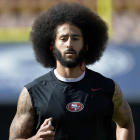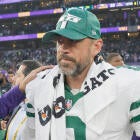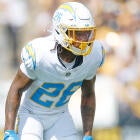The last time I spoke to Colin Kaepernick, casually chatting for hours at a hip downtown New York hotel on a warm fall evening, he was on the cusp of filing a historic collusion case against the NFL. He was engaging and focused. He was passionate yet measured. He was in tremendous shape.
We spoke about football and life and the unusual struggle he was facing to merely get a chance to work out for an NFL team. He and his girlfriend, Nessa Diab, showed me photos and videos of Kaepernick's workouts and his visits to countless schools and camps, where children embraced him and gravitated to him in a real and genuine way. They did it in the manner in which I might show an acquaintance photos of my own kids, beaming with a parent's pride. They asked me, in hindsight, probably as many questions as I asked them.
I didn't know it at the time, but they were already fortified for what 2018 might bring – two weeks after Donald Trump had called protesting NFL players sons of bitches – with it becoming increasingly clear that no team was going to sign him during the 2017 season. Kaepernick had met with Seahawks officials that summer, but they opted not to work him out. Ravens owner Steve BIsciotti had, now infamously, urged Ravens fans to "pray" for the team as it mulled possibly signing the QB during training camp. Teams ignored Kaepernick as their quarterbacks got hurt, with the final blow, as it turns out, coming just days before we met in that hotel lobby, when the Titans rebuffed inquiries from Kaepernick's agents while bringing in the likes of Brandon Weeden, Matt McGloin, T.J. Yates and Matt Barkley, with starter Marcus Mariota hurt again.
Kaepernick had already decided on a legal team with which to proceed – I was unaware in that moment – and he inquired how I thought the owners and coaches and general managers of the NFL might react if they pursued legal action. We discussed the litany of unproven or unaccomplished journeymen backup quarterbacks who continued to get chances to sign contracts. We talked about the league office and the commissioner and the league's vast legal resources, and what degree of support he might expect from the NFLPA moving forward.
I told him that I would be shocked if any team signed him that season, and couldn't guarantee that anyone ever would, but that I believed truth and conviction were on his side. Kaepernick beamed with positivity despite the somewhat dire career prospects, and I suggested that if I were him I would be exploring legal avenues to compel teams to explain the sudden and profound lack of interest in his services.
I jumped in a cab that October Saturday night, far closer to midnight than I anticipated, with the full realization that Kaepernick had the confidence, mindset and requisite support from his inner circle to challenge the league at the appropriate time. It would be a modern-day David vs. Goliath – one man and a few lawyers vs. a corporation/institution with over $15B a year in gross revenue – and I told my producers and colleagues at "The NFL Today" early the next morning that Kaepernick was going to be prepared to take his case to levels previously unforeseen. This was not going away and might prove to be truly historic. Do not underestimate Colin Kaepernick, I told them.
I figured a legal battle would begin by the end of the 2017 season; I was quite wrong. Less than a week later, Kaepernick's lawyers, led by Mark Geragos, formally filed their collusion case against the NFL. They were already ready. They were already there. The fight was, silently, already on.
I've thought back on that night quite often in the last week, as I have considered what to make of the landmark settlement between Kaepernick and the NFL that was announced last Friday. I've recalled what a remarkable year 2018 turned out to be for Kaepernick on so many levels, all while the NFL again found ways to pretend he was something other than simply an unrestricted free agent quarterback. We might never see something quite like this again. Hopefully, never again.
The movement that he birthed when he decided to take a knee during "The Star-Spangled Banner" in the 2016 season had become increasingly mainstream, and owners pledged $90 million toward social justice measures. Patriots owner Robert Kraft, a prominent Trump supporter in 2016, now worked to procure justice for incarcerated rapper Meek Mill, Papa John's founder was ousted for racism, singers and rappers scoffed at performing at halftime of the Super Bowl out of respect for Kaepernick and Nike could not keep its Kaepernick apparel on the shelves. There was an historic overhaul of the political party in power at the 2018 mid-term elections, with grassroots political movements taking hold. The Kaepernick Effect is real.
I've been asked over and over about the settlement, and who won, and who lost and what it means. With details still so scarce – and perhaps, always so, given the high stakes and confidentiality agreements – and so few individuals truly in the know, I'd caution against anyone throwing figures at a wall and guessing at what the NFL paid to try to put this uncomfortable, unfortunate and easily-avoidable era of football labor history to bed. I'd steer clear of anyone trying to couch it in terms of a financial victory or defeat.
So I won't be going there.
But I do believe there are still some conclusions that can be drawn by the way in which this case finally came to a resolution. As the days have gone by, some thoughts have resonated. And, sadly, I can't quite call anyone a winner in the way in which we usually associate the word with sports.
Kaepernick, undoubtedly, got the league's attention. He forced its massive power structure to deal with him and, for the first time that I can remember, put the commissioner and owners and GMs on the defensive. They were the ones having to sit for hours at depositions and discovery sessions. They had to turn over electronic communications and explain their actions – or inaction when it came to not signing this player – in the way Tom Brady (Deflategate) or Sean Payton (Bountygate) or Bill Belichick (Spygate) or Richie Incognito (Dolphins hazing/bullying case) or Zeke Elliott (domestic violence case) had to in high-profile cases the last two decades.
The NFL couldn't just get system arbitrator Stephen Burbank, a Penn law professor, to throw out the merits of Kaepernick's contentions. It had to spend countless dollars over roughly 16 months to methodically comply with brief after brief and request after request and go through this grievance process. Whether the payout to Kaepernick was measured in seven figures or eight figures, the full costs associated with it for the NFL– financially and from a PR nightmare standpoint – goes far beyond that. Ultimately, the NFL had to reckon with Kaepernick, and this case did not go away until the moment the quarterback was ready for it to do so.
It began on his terms. It ended on his terms.
There is, certainly, a level of vindication in this for him. His cause was always worth fighting for, and Burbank and the NFL cannot dispute that. No one can. His aim was true.
But this was never going to be a fair fight, either.
Kaepernick, 31, is never going to get back those two years of his career. He had to trek around the country as the inquisition of NFL execs unfolded. He, too, had to pay a very real price in terms of the hours and resources required to contend for something that he, rightly, feels was about being blackballed for his politics, and not about football. And now, even the NFL can no longer argue that either; if there was no reason to settle, the league would not have settled. If there was no truth on Kaepernick's side, the lawyers would still be lawyering. This league, and these owners, don't make a habit out of throwing money away as all pursue Goodell's stated goal of pushing revenue beyond $20B a year.
Kaepernick's kneeling became an iconic act, yet he was systematically kept out of the league's broader discussion with it moving forward; he didn't get a seat at the table as the aftermath of the protest was hashed out. That isn't coming back, either. He never set out to be some type of martyr, and through all of this Kaepernick's desire has been to be a professional football player in the best league in the world. That, above all else, was clear to me that night in New York, with this collusion grievance just waiting to be electronically filed with the league on a laptop in Los Angeles.
He can sleep soundly at night, knowing his pursuit was not in vain, and his cause has resonated not just in this country, but around the world. But as of now, there is no storybook ending for the quarterback. And as much as Geragos has suggested a signing is on the horizon, I, frankly, won't believe it until I see it. Fostering an environment conducive to that outcome – and winning the ongoing struggle for hearts and minds inside the league and out – is part of his job.
But even in his voice, at a time when some would call for congratulations and celebrations, you can hear there is work still to be done. The final goal is and always has been seeing Kaepernick get an opportunity to compete to be back on an NFL field again. And Geragos himself can not guarantee that. The easy thing at this point would be for teams to continue to write Kaepernick off and ignore him; he already got his money, he already cost us embarrassment, we got through 2017 and 2018 without him just fine.
I sincerely hope that one of these 32 teams prove me wrong.
I hope that Geragos was truly signaling an imminent change in his client's employment status, and not just hoping and praying that the Patriots or Panthers or someone else answers his final Hail Mary. I hope that the next time I talk to Kaepernick, he will have just finished a practice for an NFL team, and we can recall that night in New York when he was quietly already avowed to take on the league in a way few ever have before, and he can smile about how it all finally came to pass.
![[object Object] Logo](https://sportshub.cbsistatic.com/i/2020/04/22/e9ceb731-8b3f-4c60-98fe-090ab66a2997/screen-shot-2020-04-22-at-11-04-56-am.png)


















